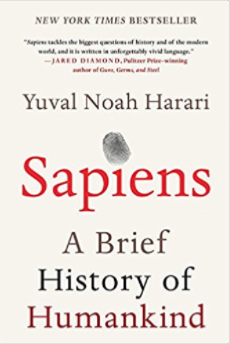THREE MAJOR HUMAN REVOLUTIONS
- The Cognitive Revolution (c. 70,000 BCE, when Sapiens evolved imagination).
- The Agricultural Revolution (c. 10,000 BCE, the development of agriculture). The unification of humankind (the gradual consolidation of human political organisations towards one global empire).
- The Scientific Revolution (c. 1500 CE, the emergence of objective science).
# YEARS AGO
- 13.5 billion: Matter and energy appear. Beginning of physics. Atoms and molecules appear. Beginning of chemistry.
- 4.5 billion: Formation of planet Earth.
- 3.8 billion: Emergence of organisms. Beginning of biology.
- 6 million: Last common grandmother of humans and chimpanzees.
- 2.5 million: Evolution of the genus Homo in Africa. First stone tools.
- 2 million: Humans spread from Africa to Eurasia. Evolution of different human species.
- 500,000: Neanderthals evolve in Europe and the Middle East.
- 300,000: Daily usage of fire.
- 200,000: Homo sapiens evolves in East Africa.
- 70,000: The Cognitive Revolution. Emergence of fictive language. Beginning of history. Sapiens spread out of Africa.
- 45,000: Sapiens settle Australia. Extinction of Australian megafauna. 30,000: Extinction of Neanderthals.
- 16,000: Sapiens settle America. Extinction of American megafauna. 13,000: Extinction of Homo floresiensis. Homo sapiens the only surviving human species.
- 12,000: The Agricultural Revolution. Domestication of plants and animals. Permanent settlements.
- 5,000: First kingdoms, script and money. Polytheistic religions.
- 4,250: First empire – the Akkadian Empire of Sargon.
- 2,500: Invention of coinage – a universal money. The Persian Empire – a universal political order ‘for the benefit of all humans’. Buddhism in India – a universal truth ‘to liberate all beings from suffering’.
- 2,000: Han Empire in China. Roman Empire in the Mediterranean. Christianity.
- 1,400: Islam.
- 500: The Scientific Revolution. Humankind admits its ignorance and begins to acquire unprecedented power. Europeans begin to conquer America and the oceans. The entire planet becomes a single historical arena. The rise of capitalism.
- 200: The Industrial Revolution. Family and community are replaced by state and market. Massive extinction of plants and animals.
- 0 (The Present): Humans transcend the boundaries of planet Earth. Nuclear weapons threaten the survival of humankind. Organisms are increasingly shaped by intelligent design rather than natural selection.
- The Future: Intelligent design becomes the basic principle of life? Homo sapiens is replaced by superhumans?
